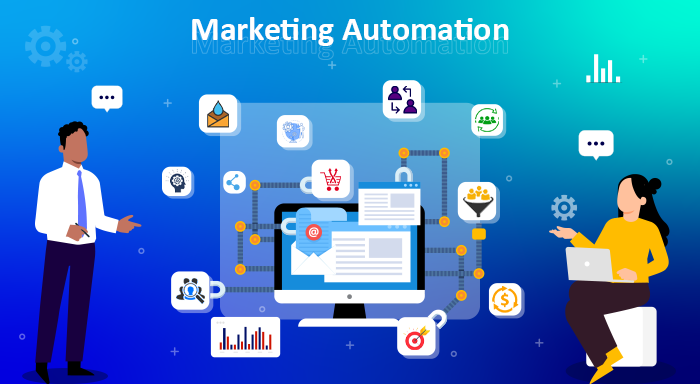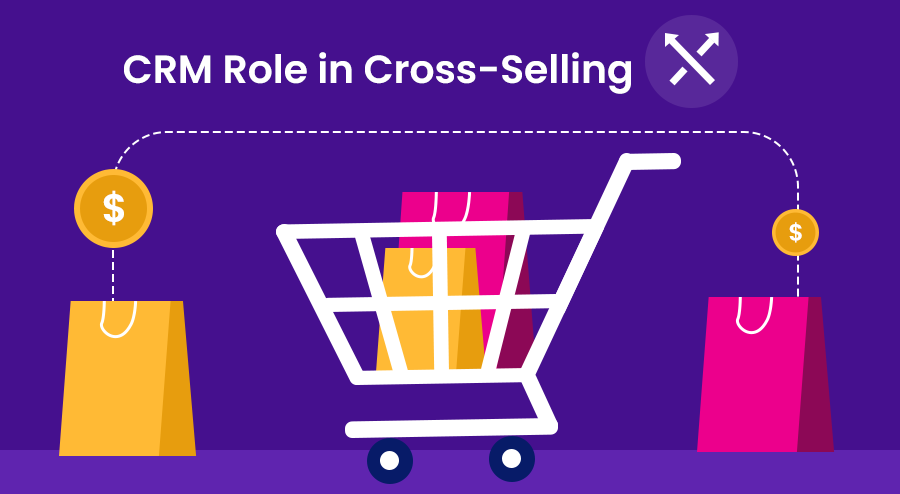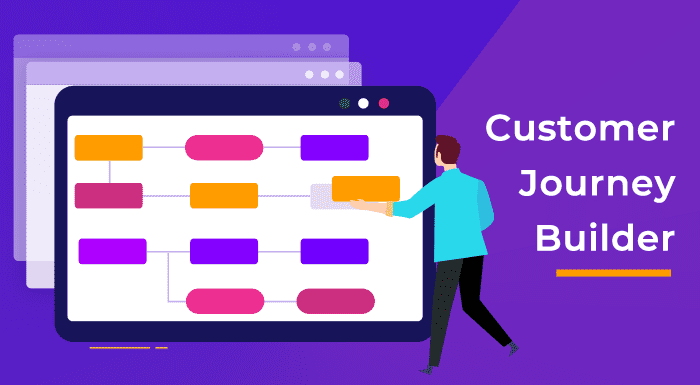Imagine a world where customers eagerly share their data, anticipating a tailor-made brand experience, only to be greeted with the same, uninspiring messages. Even though companies can collect the data, they’re not putting it to any use. This is a major challenge among many that marketers face. Therefore in this article, we are going to share marketing automation insights that will help you overcome these challenges and let you provide personalized customer experience.
What is Marketing Automation?
Marketing automation is a set of practices achieved with the help of software. The goal is to identify potential customers and then automate the lead nurturing process through emails, drips, or other marketing tactics. With the help of this, you can streamline and automate repetitive tasks, which results in better results and fewer human errors in the process.
A marketing automation platform solves a bunch of problems that are in your way to achieving goals like increased revenue and business growth. With this automation, you can do the following things:-
- Lead generation
- Upselling and cross-selling
- Customer segmentation
- Targeted marketing
- Drip marketing
- Customer engagement
- Nurturing campaign
- ROI (Return on Investment) measurement
- Customer Retention
- Actionable insights and reporting
When all these tasks are accomplished automatically, you can focus on other marketing activities like planning a campaign and content strategies and examining KPI (Key Performance Metrics) to optimize the upcoming campaigns.
Benefits of Marketing Automation Software for a Business
As we discussed earlier, generating new leads for your business and keeping existing customers engaged at every stage of their journey are two of the most demanding yet important tasks. And we have just barely scratched the surface, other underlying problems need to be addressed. Marketing automation solves these problems and provides the following benefits as well.
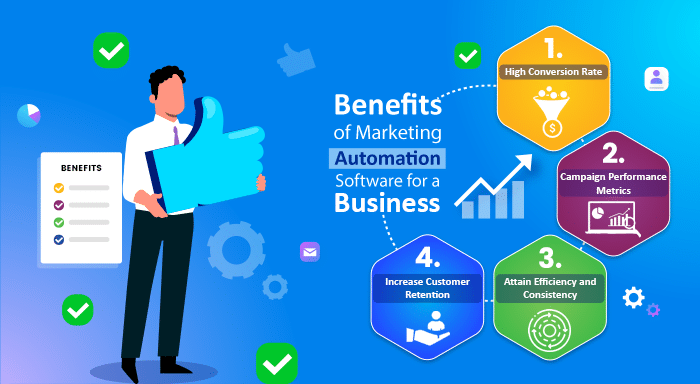
1. High Conversion Rate
When using a marketing automation platform, marketers can collect crucial customer information that later on is used for understanding the behavior, preferences, and needs. After assessing this data, you can target the right customer with the right message. It means you’ll know which customers are more interested in your products or services so you can converge your time and energy onto those customers only. In this way, you wouldn’t be wasting your time on leads that will not convert whatsoever.
2. Campaign Performance Metrics
If you are a marketer then you must know about marketing campaign metrics like CTR (Click-through-rate), conversion rate, (CPC) Cost Per Click, (CPA) Cost Per Acquisition, etc. These benchmarks allow you to judge how a campaign is performing. Based on these metrics you can make the required adjustments or find if a campaign needs to be shut down.
3. Attain Efficiency and Consistency
With marketing automation, your efficiency will be higher than ever before. For example, you can schedule campaigns for upcoming months, ensure every team has the same goal in mind, and work collectively towards that goal. You can also align the activities of various departments.
4. Increase Customer Retention
The biggest marketing myth ever is -“The marketing ends when you generate a lead for your company”. But the fact is you need to keep continuing your marketing efforts, including using referral software, if you want to retain your customers Through marketing automation, you can run customer loyalty programs or referral programs so that customers keep engaging with your brand.
Customer Data and Marketing Automation!
Marketing automation and customer data go hand in hand. To build successful marketing campaigns, you need to have a centralized customer database for all your business applications. Marketing automation alone can’t do anything if there is no proper customer data management system, for example, CRM (Customer Relationship Management) software.
Your job doesn’t end here, you also need to consider what type of data are you collecting. Is it helping you identify customer behavior, purchasing patterns, preferences, needs, etc? This data gives you insight into the customer journey and the marketing automation platform leverages this information to deliver the relevant message to the customer at all times.
At this stage, knowing the term data decay has become crucial. Data decay means the obsoleting (aging) of information to an extent that it doesn’t make sense any longer. This happens because people change their jobs, email addresses, and phone numbers, companies merge and some go out of business. If not updating and maintaining all the latest information then your campaign will make no sense at all. To avoid this, you can go for a CDP(Customer Data Platform), it’s an application that collects and combines data from various sources to create a “Single Unified Customer Profile”. Since you’re getting information from multiple sources, you can be assured that data is up-to-date.
Types of Marketing Automation
Marketing automation is quite a big domain to start with. For your convenience, we break it down into n marketing automation types. Let’s have a look at them one by one.
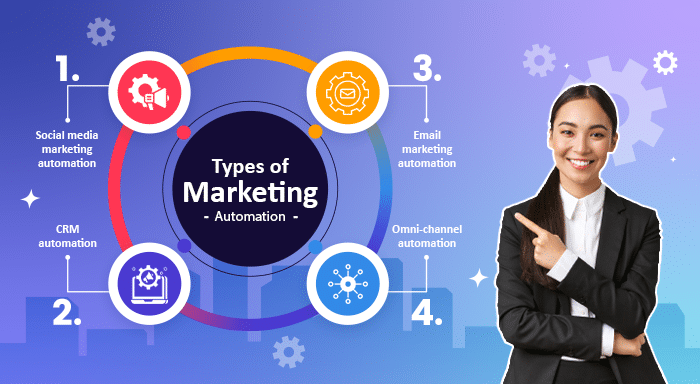
1. Social media marketing automation: Social media automation means automating basic and repetitive tasks like creating and scheduling posts, basic customer service, generating data analytics reports, etc. Automating such tasks saves a lot of time marketer's time and allows them to focus on high-level tasks.
2. CRM automation: CRM automation comprises workflows like automating data entries. For example, you can automate the process of creating records (leads, opportunities, cases) by parsing data from emails. This saves a lot of users’ time. Other things that you can automate with a CRM are personalized email sequences, sales funnel, etc.
3. Email marketing automation: Email marketing automation is the most famous and effective type of marketing automation. Marketers use this to deliver their promotional emails automatically at the right time. Because of these automated emails, businesses have witnessed a surge of 80% in their total lead generation.
4. Omni-channel automation: Omni means multiple channels depict platforms through which you are communicating with your customers. Automation means delivering consistent content throughout all social media channels.
Leverage Email Marketing Automation for High ROI
In this section, we are going to brief you about email marketing automation. You must be wondering, why we chose this type of automation in particular. And the answer is “Effectiveness”. Statistics have shown that email automation is far more effective and engaging than any other automated marketing.
Automated email marketing is a series of personalized emails that are automatically sent to customers when they meet predetermined criteria. Brands use email automation to engage with customers throughout their journey. Automated drip emails are also a kind of email marketing automation that will help you reach the desired outcomes. We’re going to show you a tool that will help you run automated drip emails easily.
Automate Email Marketing with SuiteCRM Automated Drip Campaign
There are a bunch of premium and freemium options available in the market, but most of them are either too expensive or limited functionalities. On the other hand, SuiteCRM Automated Drip Campaign is a One-time payment solution, therefore it's a better option than other tools like Mailchimp and SendGrid. This might also be the HubSpot alternative because it works in tandem with an open-source CRM (SuiteCRM) that helps you centralize your customer data.
Let us give you some insight into SuiteCRM, it’s an open-source CRM and one of the most used in the world. We have developed an add-on for SuiteCRM called the Email Drip campaign that allows you to automate email campaigns. Let’s see how can we do that in simple steps.
Step 1: Create a marketing campaign
Give a name to the campaign then choose the recipient’s module. After that, we’ll need to select a trigger or event i.e. when a contact will add to the mailing list. Such as if a lead status changes from cold lead to hot lead then it will act as a starting condition. For this, choose a field and then enter the field value. Lastly, choose who’s going to be the sender.
Step 2: Choose the time delay and content
After setting a starting condition, we will create an automated workflow. Here, you can choose the email templates and then select the time delay in days, hours, and even minutes. Just like this, you can set multiple email templates at different time intervals.
Step 3: Track email status
We have a dashboard that shows you how recipients have been engaging with your emails. In this dashboard, you can see which email template was sent to which customer. Additionally, you can see the current status “sent” and “in queue”. Additionally, you can see the number of impressions of the recipient.
Get SuiteCRM Email Drip
Unlock the Power of Email Marketing Automation with SuiteCRM Email Drip!
? Email Drips: Set up automated email sequences that nurture leads and boost engagement.
? Status-Based Email Campaigns: Send targeted messages based on user behavior and preferences.
? Schedule Email Campaigns: Plan and automate your email marketing on your terms.
Ready to supercharge your email strategy? Try SuiteCRM Email Drip today and experience the difference.
Start Free TrialTL;DR
Here, we have discussed marketing automation and how businesses are benefiting from it. In addition to this, we have also explained what things you can achieve if you plan, execute, and optimize your marketing automation strategy perfectly. Also, we discussed an email marketing automation tool because of its immense potential to grow a business’s revenue.

